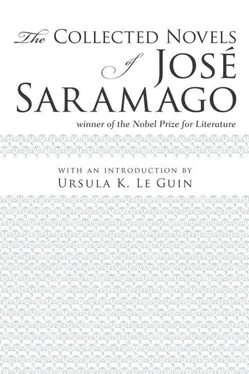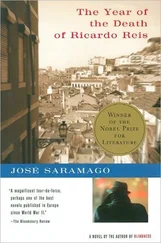As dawn broke, he got to his feet. The sky was clear and transparent, and even the palest stars could be seen in the distance. It was a fine day on which to be entering Lisbon, and with time to linger before continuing his journey, he postponed any decision. Burying his hand in the knapsack, he took out his shoddy boots, which he had not worn once during the journey from Alentejo and had he worn them, he would have been obliged to discard them after such a long march, and demanding new skills from his right hand and using his stump, as yet untrained, he managed to get his feet into them, otherwise he would have them covered in blisters and calluses, accustomed as he was to walking in bare feet during his time as a peasant, then as a soldier, when there was never enough money to buy food, let alone to mend one’s boots. For there is no existence more miserable than a soldier’s.
When he reached the docks, the sun was already high. The tide was in, and the ferryman alerted any remaining passengers embarking for Lisbon that he was about to cast off. Baltasar Sete-Sóis ran up the gangway, his irons jangling inside his knapsack, and when a witty fellow quipped that the one-handed man was obviously carrying horseshoes in his sack to protect them, Sete-Sóis looked at him askance and, putting his right hand into his knapsack, drew out the spike. If that was not congealed blood on the iron, it looked uncannily like the real thing. The witty fellow averted his eyes, recommended his soul to St Christopher, who is reputed to protect travellers from evil encounters and other misfortunes, and from that moment until they reached Lisbon he did not utter another word. A woman sat down beside Sete-Sóis, unpacked her provisions, and invited those around her, out of politeness rather than any willingness to share her food, but with the soldier it was different, and she insisted at such length that Baltasar finally accepted. Baltasar did not like to eat in the presence of others with that solitary hand of his which made for difficulties, the bread slipping between his fingers and the meat dropping on the floor, but the woman spread his food on a large slice of bread, and by manoeuvring with his fingers and the tip of the penknife he had drawn from his pocket, he managed to eat quite comfortably and with a certain finesse. The woman and her husband were old enough to be his parents, this was no flirtation over the waters of the Tagus, but friendship and compassion towards a man who had come back from the war, maimed for life.
The ferryman raised a small triangular sail, the wind assisted the tide, and both wind and tide assisted the ship. The oarsmen, restored by alcohol and a good night’s rest, rowed steadily at an easy pace. When they rounded the coastline, the ship was buffeted by a strong current, it was like a journey to paradise, with the sunlight flickering on the surface of the water, and two shoals of porpoises, first one, then the other, were crossing in front of the ship, their skins dark and shiny, their movements arched as if they were striving to reach the sky. On the other side, towering above the water and in the far distance, Lisbon could be seen stretching beyond the city walls. The castle dominated the panorama, while church towers and spires rose above the rooftops of the houses below, a blurred conglomeration of gables. The ferryman began to tell a story, An amusing thing happened yesterday, if anyone is interested, and everyone was interested, because storytelling is a pleasant way to while away the time, and this was a long journey. The English fleet, which can be seen over there in front of the coast of Santos, anchored yesterday, and is carrying troops on their way to Catalonia, bringing reinforcements to the army awaiting them, and with the fleet arrived a ship carrying a number of criminals on their way to exile on the island of Barbados, and some fifty prostitutes who were also going there, to form a new colony, for in such places the honest and the dishonest amount to pretty much the same thing, but the ship’s captain, old devil that he is, thought they could form a much better colony in Lisbon, so he decided to lighten his cargo and ordered that the women be put ashore, I’ve seen some of those slender English wenches for myself, and some of them are quite attractive. The ferryman laughed in anticipation, as if he were drawing up his own plans for carnal navigation and calculating the profits to be made from those who would board his ship, while the oarsmen from the Algarve roared with laughter, Sete-Sôis stretched out like a cat basking in the heat of the sun, the woman with the provisions pretended not to be listening, her husband vacillated, wondering whether he should look amused or remain solemn, because he could not take such tales seriously, nor was it to be expected of one who came from the distant region of Pancas, where from the day a man is born until the day he dies, everyday life, real or imagined, is the same old drudge. Hitting on one idea, then another, and for some mysterious reason linking the two, he then asked the soldier, How old are you, sir, whereupon Baltasar replied, I am twenty-six years of age.
There stood Lisbon, presented on the palm of the earth, a façade of high walls and tall houses. The ship landed at Ribeira, the boatswain manoeuvred the vessel alongside the quay, the sail having been lowered beforehand, and with one concerted movement the oarsmen on the mooring side raised their oars, while those on the other side of the ship strained to keep the vessel steady, one final turn of the rudder, a rope was thrown over their heads, and it was as if the two banks of the river had suddenly been joined together. Because of the receding tide, the quay was rather high, and Baltasar assisted the woman with the basket and her husband, while the witty fellow got to his feet smartly and without a word took one leap and landed safely.
There was a confusion of fishing boats and caravels unloading cargo, the foremen hurled insults and bullied the black stevedores, who worked in pairs and were drenched by the water trickling from the baskets and bespattering their faces and arms with fish scales. It looked as if the entire population of Lisbon had congregated in the market place. Sete-Sóis could feel his mouth watering, it seemed as if all the hunger accumulated during the four years of war was now bursting the dykes of resignation and self-control. He felt his stomach contract in knots, and his eyes searched instinctively for the woman who had offered him food, where could she have gone with that passive husband of hers who was probably staring at the women in the crowd and trying to catch a glimpse of the English whores, for every man is entitled to his dreams.
With little money in his pocket except for a few copper coins that jingled far less than the irons in his knapsack, Baltasar had to decide where to go next, to Mafra, where he would find it difficult to wield a hoe with only one hand, or to the Royal Palace, where he might receive alms because of his disability. Someone had made this suggestion in Évora, while warning him that you had to beg with insistence and at great length and to be sure to flatter your benefactors, for even when you adopted these tactics, you could still become hoarse or drop dead without seeing so much as the colour of a coin. When all else failed, you could turn to the guilds, who dispensed charity, or the convents, where you were always certain of a bowl of soup and a slice of bread. Besides, a man who has lost his left hand does not have much to complain about, if he still has his right hand to extend to passers-by or a sharp spike with which to intimidate them.
Sete-Sóis strolled across the fish market. The fishwives hollered at potential buyers, vying for their attention with waving arms that jangled with gold bracelets, and screaming oaths, hands on hearts, bosoms heaving with necklaces, crosses, charms, and chains, all made from Brazilian gold, as were the large earrings they wore in every conceivable shape, valued possessions that enhance a woman’s beauty. In the middle of this filthy rabble, the fishwives looked remarkably clean and tidy, as if untainted even by the smell of the fish they handled. At the door of a tavern standing next to a jeweller’s shop, Baltasar bought three grilled sardines on top of the indispensable slice of bread, and blowing and nibbling as he went, he headed for the Palace. He entered the slaughterhouse that looked on to the square, to feast his eyes on the gaping carcasses of pigs and oxen, on whole sides of beef and pork hanging from hooks. He promised himself a banquet of roast meats just as soon as he could afford it, little suspecting that one day soon he would come here to work, thanks to his godfather’s good offices but also to the hook he carried in his knapsack, which was to prove useful for heaving carcasses, draining tripe, and tearing away layers of fat. Apart from the blood, the slaughterhouse was a clean establishment with white tiles on the walls, and unless the butcher cheated on the scales, there was no other danger of being cheated, for in terms of quality and protein there is nothing to compare with meat.
Читать дальше












